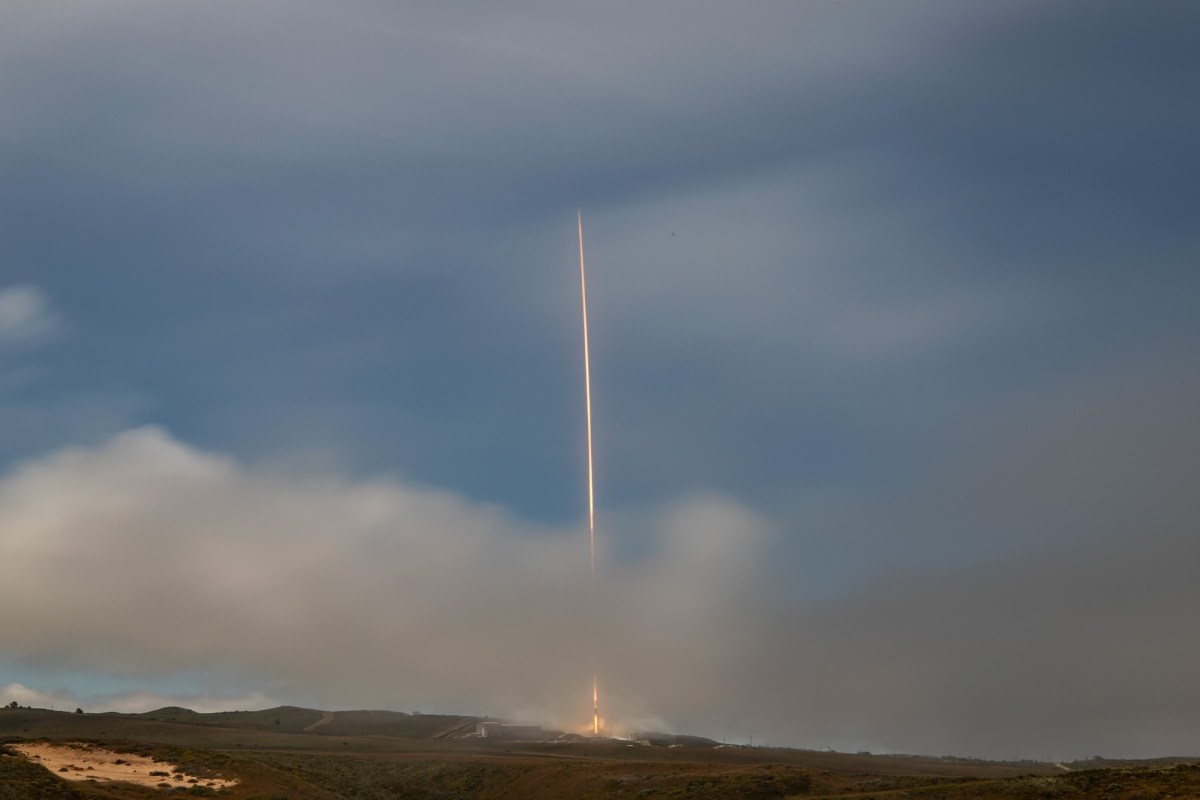NATIONAL HARBOR, Md. — Omnispace says it is seeing interference from direct-to-device payloads on recently launched SpaceX Starlink satellites, offering an early test of new Federal Communications Commission regulations about such services.
During a panel at the International Telecoms Week conference here May 16, George Giagtzoglou, vice president of strategy at Omnispace, said his company now had “empirical evidence” of increased noise in S-band from Starlink satellites that have payloads operating on similar frequencies.
“We’ve talked in the past about there being academic evidence, engineering studies. What we are actually seeing now with those satellites in operation is empirical evidence,” he said. “You see the noise floor on our satellites increase to the degree that services cannot be provided.”
After launching a handful of Starlink satellites with experimental direct-to-device payloads, SpaceX has ramped up deployment of satellites with payloads intended to communicate directly with unmodified mobile phones. Two Falcon 9 launches from California on May 10 and May 14 each carried 13 satellites with direct-to-device payloads, part of 20 Starlink satellites launched overall on each mission.
Omnispace has been among the companies critical of SpaceX’s plans to partner with mobile network operator T-Mobile in the U.S. to provide direct-to-device services using terrestrial T-Mobile spectrum in the same band as Omnispace’s mobile satellite services (MSS) assignment from the International Telecommunication Union (ITU). Omnispace has plans for a constellation of more than 600 satellites but currently only operates a few experimental satellites in low and medium Earth orbits.
“There are rules about this. We have rights from the ITU to operate our satellites in our band, in our orbits,” he said. “It’s fine to sort of move fast and break things, but at some point things will get shut down when they interfere with regulations.”
That reported interference could become a test of new FCC regulations adopted in March about direct-to-device satellite services, called Supplemental Coverage from Space (SCS) by the agency. The SCS regulations treat those services as secondary to primary frequency allocations, like Omnispace’s MSS assignment. Omnispace said at the time they were encouraged by the FCC’s decision to make SCS a secondary service but remained concerned about potential interference from Starlink direct-to-device payloads.
Despite the interference concerns, Giagtzoglou and others on the panel remained optimistic about the prospects of direct-to-device satellite services for mobile handsets as well as Internet of Things devices. “The changes that we’re looking at here are substantial and revolutionary for the satellite industry,” he said.
Those opportunities, panelists said, range from helping mobile network operators fill dead zones to enabling new applications, like vehicle telematics. Many of those applications will involve working with mobile network operators. “Nobody knows those markets better than the carriers,” said Francis O’Flaherty, chief operating officer and managing director of Rivada Space Networks. “Being able to offer them a service that can expand their markets and offer them new revenue opportunities is phenomenal.”
Lynk, which is deploying a satellite constellation to provide direct-to-device messaging services, is partnered with eight operators in seven countries, said Dan Dooley, the company’s chief commercial officer. “You don’t know it’s space-based. You don’t necessarily care,” he said of the services his company offers. “It is a very frictionless way to participate in a trillion-dollar business.”

Isn’t this evidence concerning the potential impact of Starlink’s direct-to-device payloads on satellite services quite significant? How do you think the FCC should address this interference issue?
mexico drug stores pharmacies: medication from mexico – pharmacies in mexico that ship to usa
purple pharmacy mexico price list
semaglutide http://rybelsus.tech/# Semaglutide pharmacy price
semaglutide
rybelsus coupon: cheapest rybelsus pills – buy rybelsus online
rybelsus cost rybelsus pill cheapest rybelsus pills
buy semaglutide pills: buy rybelsus online – rybelsus price
ozempic coupon ozempic cost buy cheap ozempic
buy ozempic pills online [url=https://ozempic.art/#]ozempic generic[/url] ozempic online
ozempic generic: ozempic – buy ozempic
cheapest rybelsus pills: buy semaglutide pills – buy rybelsus online
https://ozempic.art/# buy ozempic
rybelsus price rybelsus cost rybelsus pill
http://ozempic.art/# ozempic coupon
rybelsus coupon: semaglutide online – buy rybelsus online
ozempic coupon: ozempic – ozempic online
buy rybelsus online: rybelsus price – rybelsus pill
http://ozempic.art/# ozempic
buy semaglutide pills semaglutide cost semaglutide tablets
buy ozempic: ozempic cost – ozempic coupon
https://rybelsus.shop/# buy semaglutide online
semaglutide cost: cheapest rybelsus pills – buy semaglutide online
http://rybelsus.shop/# buy semaglutide pills
rybelsus cost semaglutide cost semaglutide online
ozempic coupon: ozempic coupon – buy ozempic pills online
ozempic online buy ozempic pills online Ozempic without insurance
https://ozempic.art/# ozempic online
https://ozempic.art/# ozempic
cheapest rybelsus pills: rybelsus price – semaglutide online
buy ozempic pills online buy ozempic ozempic online
пинап казино пин ап казахстан пин ап
pin-up bonanza: pin up bet – pin up bet
https://pinupru.site/# пин ап зеркало
pin-up bonanza: pin-up casino giris – pin up casino giris